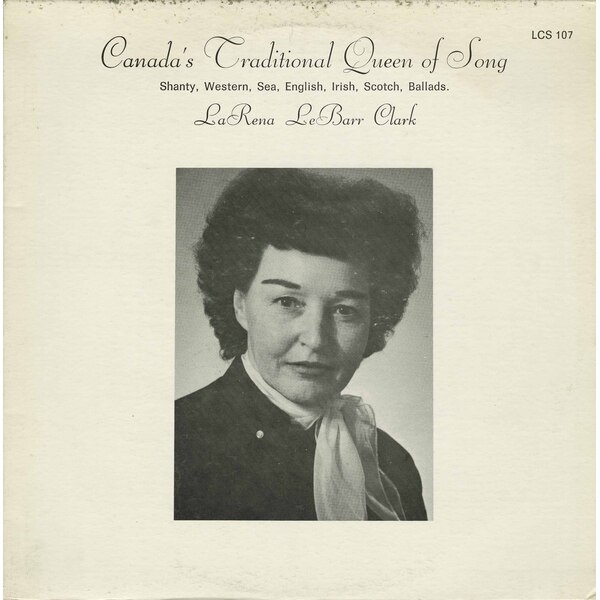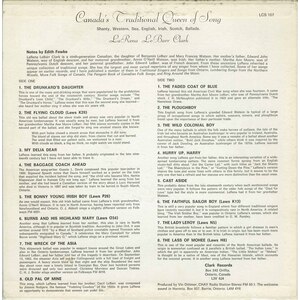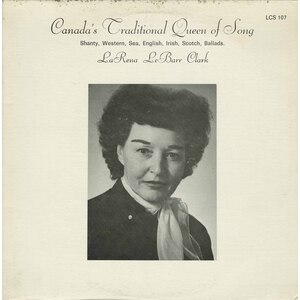Information/Write-up
Liner notes:
Canada’s Traditional Queen of Song
Shanty, Western, Sea, English, Irish, Scotch, Ballads.
LaRena LeBarr Clark
Notes by Edith Fowke
LaRena LeBarr Clark is a ninth-generation Canadian, the daughter of Benjamin LeBarr and Mary Frances Watson. Her mother’s father, Edward John Watson, was of English descent, and her maternal grandmother, Annie O’Neill Watson, was Irish. Her father’s mother, Martha Ann Moore, was of Pennsylvania Dutch extraction, and her paternal grandfather, John Edward LeBarr, was of French descent. From these ancestors LaRena inherited a unique collection of traditional songs. She has the largest and most varied repertoire of any singer from whom I have collected. Some of her songs appear on earlier records, and I have published a number of them in Traditional Singers and Songs from Ontario, Lumbering Songs from the Northern Woods, More Folk Songs of Canada, The Penguin Book of Canadian Folk Songs, and Ring Around the Moon.
SIDE ONE
THE DRUNKARD’S DAUGHTER
This is one of the many anti-drinking songs that were popularized by the prohibition forces toward the end of the nineteenth century. Similar songs include: “The Drunkard’s Lone Child,” “The Drunkard’s Wife,” “The Drunkard’s Dream,” and “The Drunkard’s Horse.” LaRena notes that this was the second song she learned—she heard her mother sing it when she was six years old.
THE FLYING CLOUD (Laws K28)
This old sea ballad about the slave trade and piracy was very popular in North American lumbercamps. It was usually sung by men, but LaRena learned it from her grandmother Martha Ann Moore LeBarr. Her first stanzas normally constitute the second part of the ballad, and she forgot to sing the unusual stanzas she knows:
With poor boiled coffee caused a stench across that stums it did turn:
The blood of slaves did dye and stain, from welcome to a man that burned.
No shoes on feet, no blue gallant sails, no welcome to a man;
The sea was black as fog at thick, no night watch we could stand.
MY DELIA DEAR
LaRena learned this song from her father. It probably originated in the late nineteenth century but I have not been able to trace it.
THE BAGGAGE COACH AHEAD
The American songwriter Gussie L. Davis composed this popular tear-jerker in 1896. Sigmund Spaeth notes that Davis himself worked as a porter on the train that supplied the incident behind the song, of “the wild wide where the storms howl Kappperdy” died in Kansas City along. LaRena learned the song from Mr. Tettler Klapper, who used to ride her father’s canoe version of the song to bury at Lucy Harwood who died in Lindsay in 1897 and was taken for her to be buried at South March, Ontario.
THE BONNY YOUNG IRISH BOY (Laws P26)
As one would expect, this old Irish ballad came from LaRena’s Irish grandmother Annie O’Neill Watson. It is rare in North America, having been reported only from Newfoundland and Ontario. J. D. Alphon sings a slightly different version for Helen Creighton.
BURNS AND HIS HIGHLAND MARY (Laws O34)
Another song that LaRena learned from her grandmother. It is rare in North America, although it is popular in Scotland. One stanza and the chorus were written and/or “set” by a Walter S. Scott to poetic prose constructed by Thomson who subsequently emigrated to Canada. It celebrates the Mary Campbell from whom Burns wrote “Highland Mary” and whose legend shines on a privileged poet.
THE WRECK OF THE ASIA
This shipwreck ballad was popular in seaport towns around the Great Lakes and was evidently written by a seaman about the wreck of the steamer Asia, commanded by Edward Irving, on Georgian Bay. The father of the tragedy is described: September 14, 1882. There were 13 survivors out of her Collingwood and 100 passengers and crew. Captain Irving and his family, as well as most of the crew and passengers, drowned. The song was included in Georgian Bay Ballads by Norah Story. LaRena learned her version from her grandfather.
OLD PAL OF MINE
This song, which LaRena learned from her brother, Cecil LeBarr, was composed by Al Piantadosi. Piantadosi was popular in the early part of the 1920s. It gives LaRena’s rendering of this song.
SIDE TWO
THE FADED COAT OF BLUE
LaRena learned this old American Civil War song when she was fourteen. It came from her grandmother Martha Ann Moore LeBarr, who was of Pennsylvania Dutch stock. J. K. McMahon published it in 1865 and offered an alternate title, “The Nameless Grave.”
THE PLOUGHBOY
This English song from LaRena’s grandfather Edward Watson is typical of a large group of occupational songs in which sailors, weavers, miners, and ploughboys insist upon the importance of their particular trade.
THE WILD COLONIAL BOY
One of the many ballads in which the folk make heroes of outlaws. The tale of the wild colonial Jack Doolan is very popular in Ireland, Australia, and Newfoundland. An American source says it was a remake of an Irish song about an Australian outlaw “Jack Donahue.” My guess is that it was inspired by that career of Jack Dowling, an Australian bushranger who was hanged in 1878. LaRena learned it from her father.
HURRY UP, HARRY
Another song LaRena got from her father, this is an interesting variation of a wide-spread ballad-comic pattern. The man comes to visit the woman and she sends him specially “hurried” about. Similar songs are “The Same Old Shillelagh,” “Take the Shanty Lass,” “The Beauty’s in the Pie,” or “Cutting Down the Pine.” LaRena’s version is from the days of the horse-and-buggy, and she has also sung it with lines about the days of the streetcars. This is a rare ballad in North America and her stanzas are more distinctive than sentimental songs from this pattern.
CAST ASIDE
This ballad protests the fate of the innocent victim when such sentimental songs were popular in the 1890s. It was composed by a man named Marks. LaRena learned it from her grandfather Watson.
THE FAITHFUL SAILOR BOY (Laws K13)
This is still a very popular song in England where four different traditional singers have recently recorded it, but it is comparatively rare in North America. I did not hear another version until I heard LaRena’s. In England, the verses, which she got from her mother, have been recorded by G. W. Pursley.
THE LADY LEROY (Laws H27)
This is a shipwreck ballad from LaRena’s father about a British vessel from Halifax, Nova Scotia, that crossed the sea to far-off India. It is Irish in origin. It has been much changed by the process of folk song variation. The ballad has been noted in Newfoundland and New England.
THE LASS OF MOHEE (Laws H8)
This is one of the most popular local romantic ballads on the North American ballads. Its widespread popularity is due to a confluence of British, Irish, and American traditions. It was sung in Newfoundland, Cape Breton, Ontario, the Hawaiian Islands—where the song is known as “The Black Girl of Maui,” and on the Aleutian Islands. This is LaRena’s version of the coconut groves. It is a fine song LaRena learned from her father.
Clark Records
Box 242 Orillia,
Ontario, Canada,
L3V 5A4
Produced by Vin Dittmer, CHAY Radio Station Stereo FM 93.1. The welcome sound in Huronia, Box 937, Barrie, Ontario: L4M 4Y6
LaRena (b LeBarr) Clark. Folksinger, b LeBarr Landing, near Lake Simcoe, Ont, of French and English-Irish parents, 21 Nov 1904, d Orilla, Ont, 3 May 1991. Raised in various northern Ontario centres (her father and grandfather were hunters, trappers and boat-builders), she learned many songs from her family and developed a large and varied repertoire which included British ballads and music hall songs, country and western songs, and Canadian lumbering songs. For the collector Edith Fowke she sang a number of these songs in the early 1960s. Some were published in Fowke's collections and issued on the LP LaRena Clark: A Canadian Garland (Topic 12T140). Appearances followed on local radio stations and at folk festivals in Canada and the USA. Residing after 1975 in Hawkstone, near Barrie, Ont, Clarke continued to record, completing nine LPs for her own Clark label. In 1987 she was awarded the Marius Barbeau Medal by the Folklore Studies Association of Canada. Her biography, A Family Heritage: LaRena Clark's Story and Songs was completed by Edith Fowke and Jay Rahn in 1991.
Author Edith Fowke
read more: http://www.thecanadianencyclopedia.com/articles/emc/larena-clark



No Comments